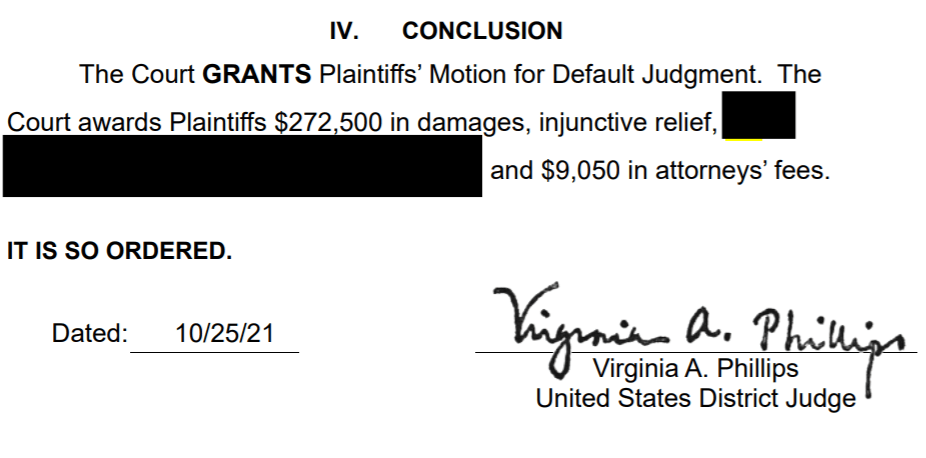As part of their ongoing efforts to shut down or disrupt pirate IPTV services, Universal, Amazon, Columbia, Disney, Netflix, Paramount, Sony, and other content creators sued Jason Tusa, the operator of the Area 51, Digital UniCorn Media, Singularity Media, and Altered Carbon services.
Tusa had been on the radar of the studios for some time and had previously shut down Area 51 after reaching a settlement agreement with anti-piracy coalition Alliance For Creativity and Entertainment. Tusa failed to honor that agreement by continuing in the pirate IPTV business, the lawsuit ensued, and in August the studios won a preliminary injunction to restraint Tusa moving forward.
Last month the plaintiffs filed a motion for default judgment, seeking maximum statutory damages for willful infringement ($150,000 per copyright work) for a total of $16,350,000. They also sought execution of a confidential settlement sum previously agreed with Tusa, a permanent injunction, interest, and attorney’s fees in excess of $330,000.
United States District Court Judge Virginia A. Phillips this week ruled in favor of the studios but it seems unlikely that the outcome will be enthusiastically welcomed by the plaintiffs.
Judge Summarizes Tusa’s ‘Particularly Egregious’ Behavior
Judge Phillips begins by accepting that Tusa ran various pirate IPTV services offering 2,600 channels and PPV events without having any license to do so. Then, despite agreeing to shut down Area 51, launched Singularity Media, a service that was shut down after he was confronted by ACE. Tusa then signed a settlement agreement but went on to launch Digital UniCorn Media but denied he had anything to do with it.
In February 2021, ACE/MPA investigators found that Tusa was running Altered Carbon, despite having taken a number of steps to hide his involvement. After the plaintiffs filed their lawsuit in July, Tusa engaged counsel but failed to answer or respond to the complaint. So, in August 2021, a clerk entered a default against Tusa leading the Judge to consider whether a default judgment was warranted.
Each of Plaintiffs Claims Considered
In respect of direct copyright infringement, Judge Phillips says that since Tusa streamed the plaintiffs’ copyright works on Altered Carbon without authorization, the plaintiffs were likely to succeed in their claim. When considering whether their contributory copyright infringement claim would succeed, several factors come into play.
With direct infringement already established, the Judge says that Tusa had “actual knowledge” that his 24/7 streams were unlicensed yet continued to provide them to his customers. As a result, he materially contributed to the infringement of his stream suppliers
“By operating the Altered Carbon websites and supplying the IPTV Service, Tusa facilitates, encourages, and enables the direct infringement of Plaintiffs’ Copyrighted Works,” the Judge writes, adding that both the contributory copyright infringement and inducement claims are also likely to succeed. Tusa knowingly distributed the Altered Carbon service for the purpose of infringing copyrights, Judge Phillips adds.
Since Tusa breached his earlier settlement agreement, he is also liable for a breach of contract that caused the plaintiffs “irreparable harm and concrete damage in additional costs to bring Tusa into compliance.”
Copyright Infringment Damages
As previously reported, the plaintiffs demanded maximum statutory damages of $16,350,000, representing $150,000 for Tusa’s willful direct infringement of the 109 copyrighted works in suit. The Judge acknowledges that this is just a small sample of the works infringed by Tusa and that his overall infringing activity was “continuous” and took place on a “massive scale”.
After considering all of the above, Judge Phillips concludes that a default judgment is indeed warranted. Noting that Tusa’s conduct involved running a pirate service, breaching a settlement agreement, relaunching new services, offering massive volumes of pirated content, and then failing to mount a defense, the Judge accepts that a “substantial financial penalty” is appropriate. It seems unlikely the studios will be delighted with the outcome.
“The Court awards $2,500 for each of 109 copyrights at issue, for a total of $272,500. Despite the egregiousness of Defendant’s behavior in this case, the Court declines to award the statutory maximum in damages because the number of copyrighted works at issue would amount to an excessively large award of $16,350,000,” Judge Phillips writes.
“The Court concludes that statutory damages of $272,500 for direct and secondary copyright infringement are sufficient to compensate Plaintiffs for financial losses incurred from Defendant’s infringement of Plaintiffs’ Copyrighted Works and deter Defendant from future infringement.”
Other Damages and Awards
The terms of the settlement agreement with Tusa are redacted from court documents but the Judge accepts that while the studios upheld their side of the deal, Tusa did not. As a result it appears that they are owed ‘something’, but precisely what that ‘something’ is remains confidential.
In addition, Judge Phillips was happy to hand down a permanent injunction but in respect of the plaintiffs’ demands for attorneys’ fees and costs, wasn’t prepared to award the amounts requested. In short, the studios demanded $330,600 but the Judge finds that just $9,050 is an appropriate amount.

Given that the plaintiffs previously described Area 51 as the “then-largest stand-alone pirate IPTV service by traffic in the United States,” and that massive damages are not uncommon in such cases, Tusa appears to have walked away in relatively good shape.
The terms of the confidential settlement agreement may provide important nuance but whatever the agreement, the financial terms clearly weren’t enough to deter ongoing infringement.
Judge Phillips’ order and judgment can be found here and here (pdf)
From: TF, for the latest news on copyright battles, piracy and more.
Source : Hollywood Demanded $16.3m From Pirate IPTV Services, Judge Awards ‘Just’ $272,500









